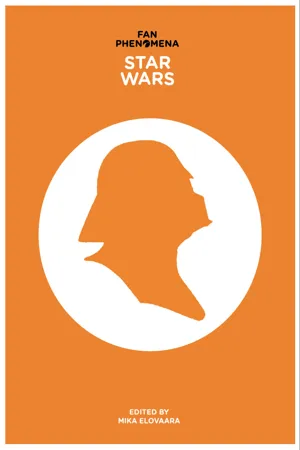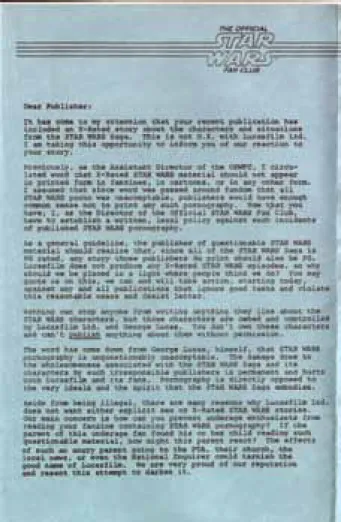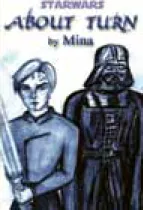![]()
Chapter
3
Fans, Fics & Films... 'Thank the Maker(s)!'
Marc Joly-Corcoran and Sarah Ludlow
→ Since 1977, Star Wars merchandise has been a staple fan favourite. For over three decades, George Lucas has taken full advantage of this fact: whether it is toys, computer games, television programmes or novels, fans of all ages and levels of enthusiasm are willing to invest time and money into owning and experiencing their own portion of Lucas’ creations. For some fans, however, the desire to be involved with Star Wars goes beyond the official merchandise and TV spin-offs.
The one part of his creation which Lucas has been unable to fully control is how his films have been used since their release, inspiring, as they have, thousands of fans to create their own extensions to his carefully crafted designs.
Fan activities are prolific the world over. This chapter aims to portray the differing levels of fannish involvement within two of the most inspired and inspiring fan mediums available: fanfiction and fanfilms. According to Csikszentmihalyi’s theory of ‘optimal experience’, ‘[...] creativity results from the interaction of a system composed of three elements: a culture that contains symbolic rules, a person who brings novelty into the symbolic domain, and a field of experts who recognize and validate the innovation’. These elements are all found within the Star Wars fandom, where experts are free to be fans and fans can become experts in their chosen medium; the viewers find pleasure in both viewing and creating within the Star Wars universe.
Fanfiction: the new fannish rebellion?
Fanfiction can be loosely defined as ‘a derivative work’ – a text based on a canon source, which is expanded upon, developed and reimagined by fans. This can include fictions based on television programmes, novels, films, comics or opera; any base text which lends itself to further development by a reader/viewer. The term ‘derivative work’ is utilized again and again within fanfic circles, and is well known, as A.T. Lee shows in the online essay, ‘Copyright 101: A Brief Introduction to Copyright for Fan Fiction Authors’. Writers use this legal loophole in copyright laws to legitimize their repeated use of protected works, much to the continued dismay of canon authors, and specifically, with regards to our area of interest, George Lucas.
The modern version of fanfiction (fics, hereafter) is recognized as having developed from the television programme Star Trek (1966–69), from which a paper-based fanzine was created by fans in order to extend the universe seen on-screen. As Camille Bacon-Smith documents in her book, Enterprising Women: Television, Fandom and the Creation of Popular Myth, these ‘zines, as they were known, were circulated by a small group of fans and swapped, borrowed or bought at fan conventions, which then led to the development of mailing lists and ‘zines being posted across country, and later, across continents. As time passed and the possibilities provided by the emerging Internet became apparent, paper-based ‘zines began to disappear, making way for instantly accessible, online fics, as well as communities that did not need to rely on long distance phone calls or snail mail to communicate. Since the mid-1990s, the growth of online fanfiction sites has boomed, and a current search on the Internet for the term ‘fan fiction site’ returns over 33 million hits.
Fighting against the Lucasfilm empire
Upon its release in 1977, the Star Wars universe became an instant fan favourite, its cult status since bolstered by sequels and novels, comics and CGI children’s programmes, action figures and cartoons. Moreover, for the past 35 years, Lucas has continuously changed and amended the original films, ruled over the direction and plots developed in the Expanded Universe, and created spin-off programmes which further explore the fictional universe that he created. With these continued renewals and reboots to his creation, it is therefore understandable that Lucasfilm and the affiliated Official Star Wars Fan Club took a dim view of the fanzines which began to appear almost immediately after A New Hope (Lucas, 1977) was released; Lucas’ ultimate creative control began to falter, falling – or rather being determinedly taken – into the hands of the fans.
Fig.1: One of a number of ‘cease-and-desist’ letters from Maureen Garrett to publishers of Star Wars fanzines, sent in 1981, stipulating the terms of fic content. Other examples can be found at Fanlore.org.
According to the Fanlore website, documented under the heading: ‘Open Letter to Star Wars Zine Publishers by Maureen Garrett’, in 1981, a series of letters were exchanged between Maureen Garrett, director of the fan club, and the publishers of multiple ‘zines, requesting that any stories, if they were to be created and distributed by fans, were to adhere to Lucasfilm standards. Specifically, this set of letters referred to fics with pornographic or overly violent storylines. This was likely brought into focus when the fic ‘Slow Boat to Bespin’, featuring a sex scene between Han Solo and Princess Leia was published, allegedly to the horror of George Lucas. That Lucasfilm did not pursue legal action was more likely due to the costs outweighing the results, yet the situation emphasized the overarching issues of copyright and prompted a reaction from Lucas-film. The underlying stipulations were made clear via a letter from Howard Roffman of the Associate General Counsel to ‘zine publishers stating that:
[…] a great deal of the infringing material published in small circulation fan publications has been overlooked by Lucasfilm because the costs of stopping such activities are often out of proportion to the amounts involved. This situation is tolerable to Lucasfilm only so long as the materials published are not harmful to the spirit of the Star Wars saga. The publication of ‘Slow Boat to Bespin’ and the threat of publishing similar articles has caused us to re-evaluate our policy, and I can assure you that it will no longer be safe for publishers such as you to feel immune from enforcement action by Lucasfilm.
No legal action was ever taken by Lucasfilm with regards to fic writers, yet these sternly worded messages appear to have affected the development of the fandom in a unique way. Lucas is openly aware of fics and ‘zines, and allows them to be published without legal recourse, whilst fans take clear steps to adhere (in the majority) to the standards requested in the 1981 letters. Whereas some authors – such as Anne Rice and Robin Hobb – have openly rejected fics based on their works, and still others, like J.K. Rowling, wholeheartedly support it, Lucas remains tentatively balanced between encouraging the fan dedication perpetuated within fic communities, and maintaining creative control of his works. Perhaps because of this, his presence seems to linger within Star Wars fics more than any other authors’ or directors’ in theirs, and as we will see in the following section, compromises are made on both sides in order to allow fans the opportunity to create, whilst simultaneously reinforcing Lucas as the final authority on all things Star Wars.
Fig.2: Cover art for ‘About Turn’, by Mina.
Fanfiction: the playful side of the Force
By moving the Star Wars characters and settings beyond the canon films, fans are able to duplicate the almost ‘paranoid mist’ Elizabeth Evans has recognized in her book Transmedia Television: Audiences, New Media and Daily Life, when fiction merges with reality, and a source text becomes important enough to an individual to matter outside its original medium. Crafting a new set of stories, or developing films based on the source text, become ways of creating and controlling a canon without having to follow the plotlines set by the original creator. In an attempt to portray the attraction of fanfiction to Star Wars fans even now, 35 years since its initial release date, let’s look at an example from a popular online archive created specifically for Star Wars fics, The Force. net. Mina’s ‘About Turn’, archived in January 2002, ranks at the top of the site’s ‘most hits’ list. The fic is considered well-received, with over 80 positive reviews, 207 ratings, and an average score of 9.71/10 across those ratings.
It is important to note from the outset that ‘About Turn’ is a true example of the balance between fan and Lucasfilm. The ‘notes’ section posted before the story remarks that ‘the author wishes it to be known that the following is an edited version of the original story. The changes were made to meet the guidelines established by TheForce.Net'. As a Star Wars-specific archive, TheForce.net has stipulated that those requests made by Lucasfilm in 1981 be adhered to, meaning that Mina’s fic – whilst existing in its full form on alternative archives – is edited here, in respect of Lucas’ wishes. This highlights the constant tension between the pleasure of partaking in fannish behaviour and the acknowledgement of the original creator as benevolently tolerant; Star Wars fans alternate between adoring Lucas and despising him, but the respect for his wishes is necessarily recognized among the fic writing community, compelling ficcers to abide by certain boundaries, or be forced to post their fics outside the more specialist archives.
That ...






